
In the Indian subcontinent, hijra are eunuchs, intersex people, or transgender people who live in communities that follow a kinship system known as guru-chela system. They are also known as aravani, aruvani, and jogappa. In Pakistan, they are known as khawaja sira, the equivalent of transgender in the Urdu language.
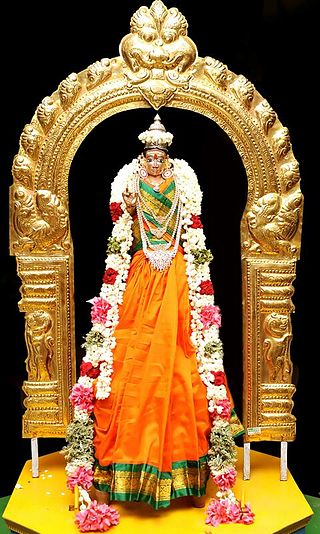
Draupadi, also referred to as Krishnā, Panchali, and Yajñaseni, is the main female protagonist of the Hindu epic Mahabharata, and the wife of the five Pandava brothers—Yudhishthira, Bhima, Arjuna, Nakula, and Sahadeva. She is noted for her beauty, courage, and polyandrous marriage.
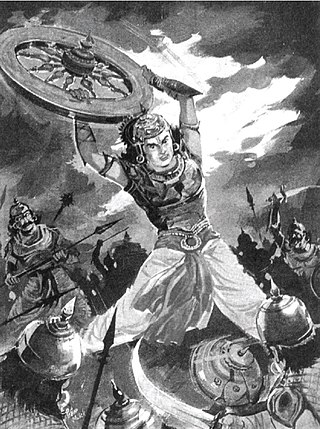
Abhimanyū is a warrior from the ancient Hindu epic Mahabharata. He was the son of Arjuna, the third of the Pandavas and the hero of the epic, and Subhadra, the younger sister of the revered Hindu deity Krishna. Abhimanyū is portrayed as a young, strong and talented warrior. He was also one of the few individuals, along with his father, who knew the technique to enter Chakravyuha, a powerful military formation.

The Parthasarathy Temple is a 6th-century Hindu Vaishnavite temple dedicated to Vishnu in Chennai, India. Located in the neighbourhood of Thiruvallikeni, the temple is glorified in the Naalayira Divya Prabandham, the early medieval Tamil literature canon of the Alvar saints from the 6th to 9th centuries CE and is classified as among the 108 Divya Desams dedicated to Vishnu. The name 'Parthasarathy' means the 'charioteer of Arjuna', referring to Krishna's role as a charioteer to Arjuna in the epic Mahabharata.

Mohini is the Hindu goddess of enchantment. She is the only female avatar of the Hindu god Vishnu. She is portrayed as a femme fatale, an enchantress, who maddens lovers and demons, sometimes leading them to their doom. Mohini is introduced into Hinduism in the narrative epic of the Mahabharata. Here, she appears as a form of Vishnu following the Churning of the Ocean, a mesmerising beauty who distributes the amrita to the weakened devas (gods) and depriving it to the dominant asuras (demons), allowing the former to defeat the latter with their newfound immortality.

The Kurukshetra War, also called the Mahabharata War, is a war described in the Hindu epic poem Mahabharata , arising from a dynastic struggle between two groups of cousins, the Kauravas and the Pandavas, for the throne of Hastinapura. The war laid the foundation for the events of the Bhagavad Gita.

Chedi was a kingdom which fell roughly in the Bundelkhand division of Madhya Pradesh regions to the south of river Yamuna along the river Ken. Its capital city was called Suktimati in Sanskrit.

Uttarā is a princess in Hindu History. In the Mahabharata, she is described to be the daughter of Queen Sudeshna and King Virata, at whose court the Pandavas spent a year in concealment during their exile. She was the sister of Uttara and Shankha.

Iravan also known as Iravat and Iravant, is a minor character from the Hindu epic Mahabharata. The son of Pandava prince Arjuna and the Naga princess Ulupi, Iravan is the central deity of the cult of Kuttantavar (Kuttandavar) which is also the name commonly given to him in that tradition—and plays a major role in the sect of Draupadi. Both these sects are of Tamil origin, from a region of the country where he is worshipped as a village deity and is known as Aravan. He is also a patron god of well-known transgender communities called Alis.

The Aranmula Parthasarathy Temple is a Hindu temple located near Aranmula, a village in Pathanamthitta District, Kerala, South India. It is dedicated to the God Krishna, an avatar of Vishnu, who is worshipped as Parthasarathy. Constructed in the Kerala style of architecture, it is one of the "Divya Desams", the 108 temples of Vishnu revered by the Alvar saints.

The Thimithi or firewalking ceremony is a Hindu festival originating in Tamil Nadu, South India that is celebrated a week before Deepavali, during the month of Aipasi of the Tamil calendar. The fire-walking ceremony is in honour of the goddess Draupati Amman, who is considered the incarnation of goddess Mariamman, and is practiced not only in India, but also in countries with large Tamil populations like Sri Lanka, Fiji, Singapore, Malaysia, Mauritius, Réunion, South Africa and others.
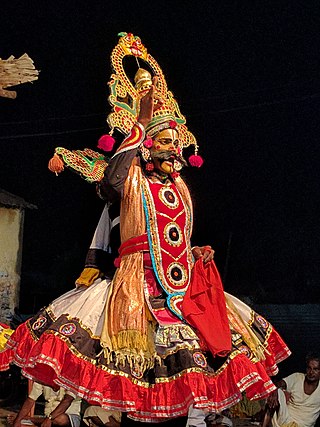
Terukkuttu is a Tamil street theatre form practised in Tamil Nadu state of India and Tamil-speaking regions of Sri Lanka. Terukuttu is a form of entertainment, a ritual, and a medium of social instruction. The terukkuttu plays various themes. One theme is from the Tamil language versions of the Hindu epic Mahabharata, focusing on the character Draupadi. The terms Terukkuttu and Kattaikkuttu are often used interchangeably in the modern times; however, historically the two terms appear to have distinguished, at least in certain villages, between two different kinds of performance: while Terukkuttu referred to mobile performances in a procession, Kattaikkuttu denotes overnight, narrative performances at a fixed performance space.

Lesbian, gay, bisexual and transgender (LGBT) rights in Tamil Nadu are the most progressive among all states of India. Tamil Nadu was the first state in India to introduce a transgender welfare policy, wherein transgender individuals can access free gender affirmation surgery in government hospitals and various other benefits and rights. The state was also the first to ban forced sex-selective surgeries on intersex infants, and also the first state to include an amendment in its state police guidelines that expects officers to abstain from harassing the LGBTQIA+ community and its members. The state also became the first to ban conversion therapy as well as the first to introduce LGBTQIA+ issues in school curricula.

In Hindu Epic, there are deities or heroes whose attributes or behavior can be interpreted as lesbian, gay, bisexual, or transgender (LGBT) or have elements of gender variance and non-heterosexual sexuality. Traditional Hindu literary sources do not speak of homosexuality directly, but changes of sex, homoerotic encounters, and intersex or third gender characters are often found both in traditional religious narratives such as the Vedas, Mahabharata, Ramayana and Puranas as well as in regional folklore.
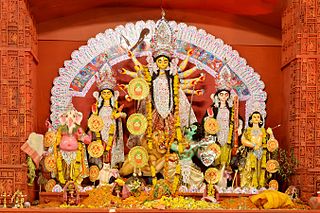
Ayudha Puja is a Hindu observance that falls on the ninth day of the bright half of the moon's cycle of 15 days in the month of September/October, popularly a part of the Navaratri festival. While the Navaratri festival is observed all over the country, the festivity that is widely marked as Ayudha Puja possesses slight variations of veneration and practices across India.
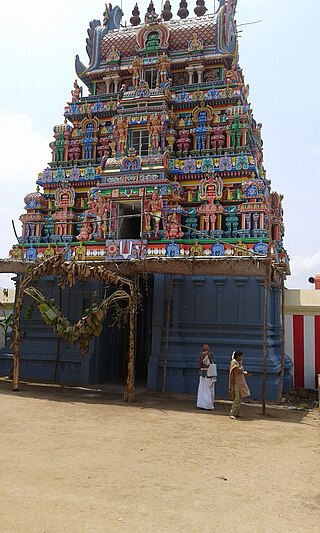
The Taamaraiyaal Kelvan Perumal Temple or Thiruppaarththanpalli is located close to Thirunangur, a small village, 8 km east of Sirkali en route to Thiruvenkadu and is dedicated to the Hindu god Vishnu. Constructed in the Dravidian style of architecture, the temple is glorified in the Nalayira Divya Prabandham, the early medieval Tamil canon of the Alvar saints from the 6th–9th centuries CE. It is one of the 108 Divya Desams dedicated to Vishnu, who is worshipped as Taamariyaal Kelvan and his consort Lakshmi as Shegamalavalli.

The Sundaravarada Perumal Temple in Uthiramerur, a village in the South Indian state of Tamil Nadu, is dedicated to the Hindu god Vishnu. Constructed in the Dravidian style of architecture, the temple. Vishnu is worshipped as Sundaravarada Perumal and his consort Lakshmi as Anandavalli. The temple was originally built by Pallavas, with later additions from the Cholas, Pandyas, Sambuvarayas, Vijayanagara Rayas and the Nayaks.
Tamil sexual minorities are Tamil people who do not conform to heterosexual gender norms. They may identify as LGBTQIA. It has been estimated that India has a population of 2.5 million homosexuals, though not all of them are Tamil, and not all Tamils live in India.

Aravan Festival also known as "Koothandavar Thiruvizha" is festival celebrated in seven places in Coimbatore city such as Vellalore, Thudiyalur, Kurichi, Singanallur, Annur, Vadavalli and Kattampatti since ancient times. It is celebrated for the Aravan, a major character in Hindu epic Mahabarata.





















